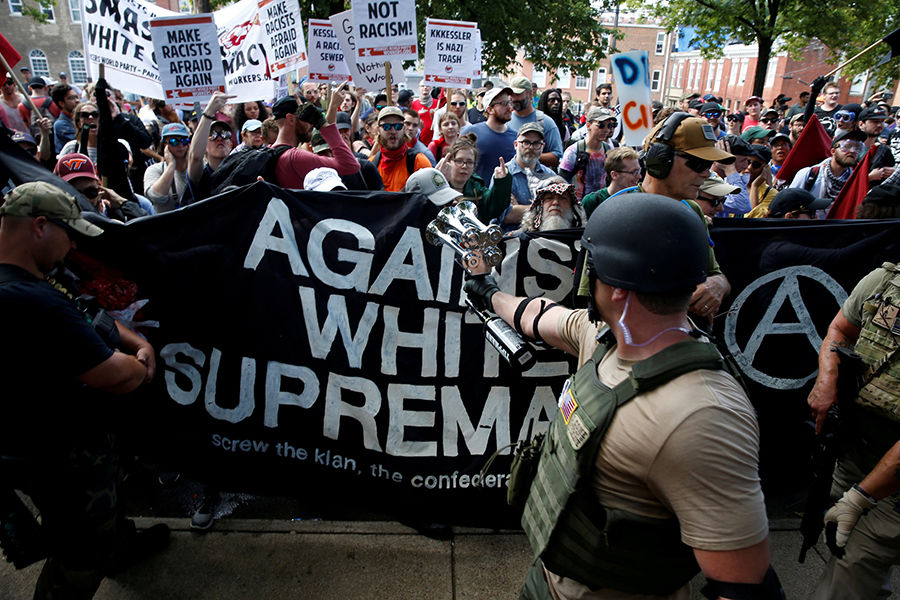The recent shocking images of young neo-Nazis and so-called white nationalists marching in the streets of Charlottesville has provoked horror and soul-searching.
As a nation we seem to be at a point of crisis and division as bad as any time since the 1960s. It isn’t just a handful of thugs with “fashy” haircuts. It’s talk radio and Tina Fey’s sheet cake, shouting matches at city hall and the shunning of family members at the Labor Day picnic. It’s vilifying gun owners and immigrants, and it is what appears to be a collective belief that anyone who holds strong opinions different from us is suffering from invincible ignorance.
“The center cannot hold,” W.B. Yeats wrote. “The best lack all conviction, while the worst are full of passionate intensity.” We all have a passionate intensity these days. The rise of identity politics and the deification of victim status — both present in Charlottesville, ironically, with nonsensical chants of “You will not replace us” — are symptoms of fragmentation. We’re chopping the “Unum” off of the “E Pluribus.”
More and more people are telling me that they’re trying to stop reading the news because it is making them so upset. This isn’t just a Trump-era phenomenon with liberals driven to distraction by the latest presidential tweet. A family counselor told me last year that many of his clients during the Obama era spoke of spouses who were watching Fox News for hours and growing enraged. The constant state of anger was hurting their relationships, he said. A priest friend has been hearing so much about all this in the confessional that he had to stand up in the pulpit and say, “This anger is not of God.”
What is happening to us? We are behaving like the lottery ticket winners whose lives fall apart after riches fall into their laps. We have this phenomenal country — blessed by wealth, blessed by natural resources, blessed by our remarkable founding documents. Yet we are profoundly unhappy.
One ex-skinhead, Christian Picciolini, who co-founded Lifeafterhate.org, says that what he and others on the violent right were looking for was identity, community and purpose.
I don’t think it’s just the alt-right that is searching for identity, community and purpose. I think it is part of our national crisis.
We’ve demythologized our past and cast a jaundiced eye on our present. Left and right and the cynical center all distrust government — it’s not the solution, it’s the problem, we’ve been told. It’s either too big or not big enough. We’ve all taken the bumper sticker slogan to heart: we all “question authority.” We turn to the internet for answers, but can’t distinguish truth from fake news. Our idealism has given way to a sinkhole of cynicism and world weariness. We are digitally connected to the world and are finding it is ruled by trolls.
Is it any wonder why young people might be searching for identity, community and purpose?
This seems the type of crisis that the Church was made for. Aren’t we all about identity and community and purpose? This is our raison d’etre! Baptism, parish, knowing, loving and serving God.
Yet our center isn’t holding either. We have the rise of the “nones,” those young people and not so young people who are leaving the churches and professing no religious affiliation.
If you talk to the nones, you’ll hear different explanations, but the truth is that they are not finding that sense of identity, community and purpose that their parents and their grandparents found.
The Church is mirroring the divisions and the stresses of society: the left/right divisions of the “Pope Benedict Catholics” and the “Pope Francis Catholics.” We also have broken into factions that distrust authority and ascribe the worst of intentions to those we dislike. We are too often mirrors, not beacons, for the fractured, hurting communities in which we live.
I don’t see any easy solutions for these ills, but it does feel as if we need to get back to basics. We need to recover our own sense of who we are. Our parishes need to be less like spiritual filling stations crowded with semi-strangers and more like places of fellowship and faith-building. At the same time, we need to recover our intellectual underpinnings — a new instruction in the faith that both reconnects us with our tradition and responds to the challenges and questions of our age.
Most importantly, we need to live the Gospel, not just read it. Like the first Christians, we must engage our world, not run from it. We need to overcome racism with love. We need to welcome the stranger. We need to care for the poor in body and the poor in spirit.
But first things first: the hating has to stop. And that starts with us.

